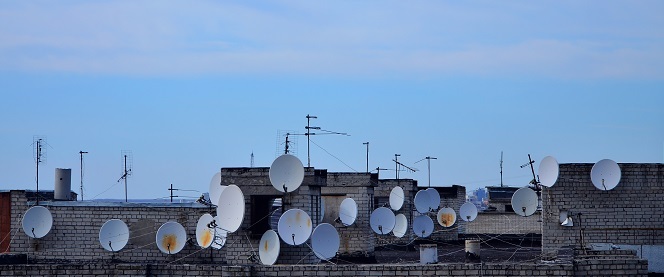
 Data Structure
Data Structure Networking
Networking RDBMS
RDBMS Operating System
Operating System Java
Java MS Excel
MS Excel iOS
iOS HTML
HTML CSS
CSS Android
Android Python
Python C Programming
C Programming C++
C++ C#
C# MongoDB
MongoDB MySQL
MySQL Javascript
Javascript PHP
PHP
- Selected Reading
- UPSC IAS Exams Notes
- Developer's Best Practices
- Questions and Answers
- Effective Resume Writing
- HR Interview Questions
- Computer Glossary
- Who is Who
What is the full form of FCC?
Introduction
Federal Communications Commission (FCC), a separate department of the American federal government. It was established in 1934 to control both national and international broadcasting, television cable, satellite communication, and cable communications.

Except for a few prohibitions about vulgarity and defamation, its rules and regulations only apply to the technical features of communication networks, such as frequency and machinery, rather than broadcast content.
FCC's Role in Regulating Communications
The United States' communications sector, including wireless communication technology like cell phones, satellite radio, and high-speed internet, is governed by the Federal Communications Commission (FCC). The FCC ensures that public radio waves are safe and that all users of these technologies may access dependable transmission and messaging services.
In several ways, the FCC controls communications services. It establishes norms for security, dependability, and privacy. Additionally, it establishes rules that control how different sectors use the airwaves. By permitting various suppliers of similar products and services to operate in a market and facilitating access to cutting-edge technologies, these regulations promote competition and benefit consumers.
The FCC has adopted numerous rules that apply to wireless communications. No matter where they are in the nation or what kind of equipment they have accessible, consumers must have a specific level of communication with emergency services under one such guideline that wireless operators must comply with. Some regulations address issues like roaming fees, taxes, and serviceable areas to encourage competition between providers.
Some regulations mandate the adoption of new technologies more quickly than before, and users must be able to transfer providers of services without experiencing service disruptions or losing any functions or abilities on their devices.
The FCC can guarantee that customers receive dependable service from a variety of providers at affordable prices, as well as an excellent level of protection, dependability, confidentiality, and simplicity when using wireless technology like cell phones or Wi-Fi connections by establishing these regulations.
History of FCC
On June 19, 1934, the Federal Radio Commission was abolished in favor of the Federal Communications Commission. The FCC has made some highly contentious rulings over its history. The FCC's mandate was broadened to encompass overseeing all kinds of media in the US as communications grew and television gained popularity.
To ensure that all kinds of communication can coexist, the FCC works to control the content, grant station charters, and keep an eye on innovation. The FCC is also active in governing Internet access in the US, and it has produced regulations that are being strongly opposed by the telecommunications sector, business users, and the country's millions of daily Internet users.
FCC's Impact on the Media and telecommunication industry
Telecommunication industry To ensure fair competition among broadcasters, cable companies, telephone companies, and other communications service providers, the FCC has put in place regulations governing mass media and telecommunications operators under the authority of the Telecommunications Act. The FCC sets rules for broadcast licenses and oversees rival satellite services in addition to regulating television broadcasters' content, ownership restrictions, and any child protections required by law.
The FCC also plays a significant role in regulating cable businesses that offer analog or digital services, including internet providers, and internet service providers. The Commission examines merger requests from significant communications companies like AT& T, Comcast, or Time Warner Cable to look for any potential antitrust issues that could result from the merging of these important carrier networks, which offer nationwide content delivery services. Additionally, the Commission offers consumer protection rules that apply to broadband internet service, such as privacy standards for practices involving consumer data collection.
Media industry By issuing warnings, imposing penalties, and canceling broadcasters' licenses when they are found to be breaking the FCC's standards, the FCC has taken a proactive approach to policing broadcast content. The FCC additionally implements rules that prevent unsuitable or obscene content from running during specific times of the week when children might be watching it.

For consumers to make educated viewing selections, the FCC also enforces truth-in-advertising laws, which provide for precise declarations regarding advertorials and sponsored programming. In the same vein, they routinely check adherence to federal requirements governing accessible formats for people with disabilities, such as those who are blind or deaf, for whom closed captioning is frequently mandated by statutes like The Television Decoder Circuitry Act of 1990.
Additionally, the FM educational bands and commercial AM or FM radio broadcasts are all governed by the Federal Communications Commission. Its main goal is to promote radio service provider competition while keeping an eye on channel interference from nearby radio stations and safeguarding the public's safety by designating accessible frequency bands for emergency communications like fire and law enforcement agencies.
Conclusion
In summary, the FCC plays a distinctive and significant role in overseeing the communications sector. To guarantee that citizens have access to dependable communication services, it establishes standards, enacts legislation, decides disputes, and distributes funding. The FCC promotes competition between businesses by carefully examining requests submitted by firms to safeguard the interests of consumers. Additionally, regularly reporting on service quality, helps to inform citizens of their rights as consumers and aids them in decision-making regarding their communications options.
FAQs
Q1. What are the six objectives of the FCC?
Ans: The FCC strives to accomplish six objectives in the following areas: the media, public safety, and security at home, competitiveness in the broadband market, spectrum use, media, and modernization of the agency.
Q2. Who is the FCC's new leader?
Ans: After her first meeting as acting chair of the FCC, Jessica Rosenworcel emphasized the urgency of the situation and the necessity of acting at this "essential time."
Q3. What steps are involved in the FCC's rulemaking procedure?
Ans: By that procedure, the FCC notifies the public that it is thinking about adopting or changing rules on a certain topic and requests feedback from the public. When creating final rules, the Commission takes into account the feedback it has received.

